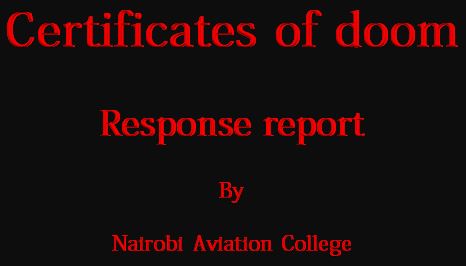 Dennis Okari did an investigative report titled ‘Certificates of Doom,’ aired by NTV on Sunday, 1 February 2015. The report focused on Aviation College, showing how the focus of the institution is on money they receive from students as opposed to the quality of graduates they churn out into the job market. It also shows how corruption is rife within the institution such that students get certificates or marks for courses they either failed or never did.
Dennis Okari did an investigative report titled ‘Certificates of Doom,’ aired by NTV on Sunday, 1 February 2015. The report focused on Aviation College, showing how the focus of the institution is on money they receive from students as opposed to the quality of graduates they churn out into the job market. It also shows how corruption is rife within the institution such that students get certificates or marks for courses they either failed or never did.
This report by Okari is a mere case study, not an investigative report, for the later normally reveals what we did not know. In fact, it is a poor case study because it fails to take note of key issues surrounding our education sector. More importantly, its incessant focus on a single institution reads as more of a witch-hunt and not an attempt at uncovering the ills plaguing tertiary institutions in our country.
You might even say that this ‘investigative report’ is a classic example of the half-baked journalism that is prevalent in Kenya given the quality of ‘reports’ and news delivered by our journalists.
Why is Okari’s ‘investigative report’ a failure? First, it trivializes the magnitude of the problem by focusing on a single and almost inconsequential institution, making it very easy for the authorities to sit pretty and do nothing after it airs. Second, it does not appreciate the struggle of ordinary Kenyans whose education system failed them, not vice versa.
Finally, Okari decides to report this matter to the people that he should be investigating i.e. the people who enable such things to happen. It is clear that Okari was looking for a fix, a high or more accurately, a wave to ride on similar to the wave Moha rode on after the Kanyiri exposé.
Kenyans do not have jobs, and this is a fact that those who earn income including Okari should begin to appreciate. Parents, who lack vision, indoctrinate their children with the idea that a degree matters in this country. This idea is a lie, but it is a lie many Kenyans continue to believe. An academic degree in this country is as useful as the sight of a beautiful painting to a blind man.
Connections, proximity to people who can make things happen and social standing are the only things that matter in this country when it comes to getting a job. The ignorant will quickly jump up and say, “That is not true. I applied for a job and got it.” Forgive such people, they have never heard of survivor bias. Educate them if you can.
Who is the victim and who is the villain. Okari fails to tackle this question because such questions do not invite straight answers. The man selling academic papers for a fee is not necessarily the same as the man who asks for sexual favors for the same papers. The latter is a villain, no doubt, but the former may as well be a victim of circumstances. The salary lecturers receive at Aviation College, and their working conditions were matters worthy of note, but the ‘report’ brushed over such serious issues.
The circumstances surrounding the students seeking those papers should be of interest to us. It was not of interest to Okari. You see, drug addicts think of nothing else after a fix or high and likewise, half-baked journalists think of nothing past their fix, high or wave.
This case study had one inarguable flaw. It treated perpetrators as potential liberators. You will see Kaimenyi, the Education Cabinet Secretary, visibly surprised at what he already knows happens throughout the country, or so I believe he does. You will see the same person expressing outrage at people selling certificates yet his colleagues i.e. Cabinet Secretaries are the ones creating a conducive environment for such things to happen. Did you see how he belittled three thousand shillings when 4 out of 10 Kenyans live on a dollar a day?
Where were the hard questions? For example, who is in charge of overseeing matters involving Aviation College within the ministry? Where was this person when all this was happening? Did he take bribes from the college? What disciplinary measures will Kaimenyi consider against him for enabling such activities through either action or inaction? There were no specifics offered or asked. Vagueness was the order of the day.
The top ten percent in Kenya pocket more than 44% of our national income. The one who belongs to the top ten percent made jokes, talked tough and promised action during the interview while the one who aspires to be in that group indulged him.
The ‘report’ concludes with ‘ordinary Kenyans’ giving their opinion on this issue. Nowhere in the ‘report’ did I hear the cries of most Kenyans. For instance, Okari does not find a single student who lost or did not get a job because the employer felt funny about the Aviation certificate. He does not delve deeply into the plight of lecturers at the institution, before and after they secured employment at the college. He does not interview any of the people exposed in his case study. I for one would like to know what drove them to such lengths. Did they do it out of greed or poverty? They can lie but at least we would get a chance to decipher those lies through either inconsistent explanations or body language.
This ‘report’ sparks a healthy debate while shifting focus from the Education Ministry to the Aviation College. People will demand answers from a minor college instead of focusing on a single institution that can change the entire education system if we put enough pressure on it to do so. Our efforts and energies will go in the wrong direction, managing a single symptom instead of curing the disease. We will have lost too much energy and momentum to do anything when we finally come to our senses yet those we should have put on the spot would have reorganized and improved their tactics.
Source: Nairobi Aviation College fb page
Follow us on twitter @kenyayote1 and like us on fb kenyayote for campus news updates in Kenya

Leave a Comment